PrivateFly Pilot Survey 2012
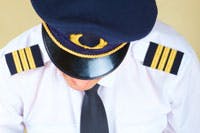
In March and April 2012, PrivateFly.com conducted an online survey of pilots across the aviation spectrum, with the results compiled in the paper below.
The objectives of the research included finding out how pilots are feeling about their jobs and remuneration - and how this compares across different sectors of aviation. The study also asked pilots about their career motivations and backgrounds, and for their travel insights.
Key findings include:
- The most common salary range for pilots surveyed was £40 000 - £70 000
- Salaries and benefits vary considerably between aviation sectors, with airline pilots faring better than others
- 65% of pilots are living out a childhood dream - having wanted to fly since early childhood
- Concorde's first flight in 1969 is the aviation event in history most pilots would most like to have been part of
- 83% of pilots passed their driving test on the first attempt
- Pilots give their insider travel tips, including avoiding jet lag (13% say jet lag does not exist)
Receive your copy of the PrivateFly.com 2012 Pilot Poll White Paper by emailing enquiries@privatefly.com. Alternatively you can read the full White Paper below. If you require any further information, or would like a copy of the PrivateFly.com 2012 Pilot Poll White Paper sent to you by email please call +44 1747 642777.
White Paper: PrivateFly.com Pilot Poll 2012
Contents
- Methodology
- Summary
- Key Findings
- Pilot profiles
- Job satisfaction & rewards
- Pilots' views on aviation
- Motivations & previous career choices
- Inside the pilot's flight bag
- About PrivateFly.com
METHODOLOGY
This paper reveals the results of an online survey of 360 pilots across the aviation spectrum, which took place in March and April 2012. The objectives of the research included finding out how pilots are feeling about their jobs and remuneration - and how this compares across different sectors of aviation. The study also asked pilots about their career motivations and backgrounds, and for their travel insights - including their flight bag must-haves and insider travel tips.
The survey was conducted online by leading private jet booking platform PrivateFly.com, using SurveyMonkey.
Invitations to participate were issued to ensure a broad demographic and geographic spread, with pilots taking part anonymously. Responses were generated from the following:
- Various international online pilot communities
- Social media including LinkedIn, Facebook and Twitter
- Trade media
- Advertising
- PrivateFly's own networks of pilots
- Through word of mouth – including a 'send to a friend' function for pilots already taking part
SUMMARY
The results of the survey were analysed, with key findings detailed in the paper below. Adam Twidell, CEO of PrivateFly.com and himself an experienced ex-military and private jet pilot commented on the results as follows:
"There is certainly a great deal of interest in pilots, from both inside and outside the aviation industry. As PrivateFly.com is a network of private charter aircraft, we were already in a position to reach many private jet pilots, and extended our survey to pilots across the aviation spectrum. Our objectives included discovering how pilots were feeling about their jobs; what had led them to take to the air in the first place; and to gain some insights into their lives and careers.
"Some of the overall results do confirm expectations, such as 65% having wanted to be a pilot since childhood and 83% passing their driving test first time – I'm sure most people will be reassured to know that pilots are equally adept behind the wheel of a car.
"However some may be surprised to discover the most popular salary band for pilots taking part was £40 000 - £70 000 ($63 000 - $111 000 or €48,000 - €84 000), the equivalent salary of a London underground driver. Or that while most enjoy their time in the air, 10% find their flying repetitive or dull.
"It was also interesting to compare pilots across aviation sectors. For example despite demonstrating greater enjoyment and autonomy, private jet pilots earn less than their airline equivalents, and receive far fewer employee benefits such as private medical cover or pensions. And military pilots give less consideration to the commercial success of their organisation than pilots of other kinds.
"On a lighter note, we asked pilots to give us their insider tips on travel – including what they pack in their own flight bags. Technology and gadgets loom large, however the majority still take paper maps and charts into the cockpit. Others gave more unusual answers such as a bike pump, nail polish remover and a bible. And opinion was divided on jet leg, with some advocating changing watches at the get go, others keeping to their original time zone; and more than one in 10 dispute the existence of jet lag altogether.
"The results, detailed below, provide some fascinating insights into many aspects of pilots' lives and careers."
KEY FINDINGS
Pilot Profiles
Aviation sectors
- Pilots were asked to describe their main aviation sector, with 30% working in private/business aviation and 20% for airlines. A further 15% have other paid flying jobs in general aviation, for example instructors or examiners.
- 8% were helicopter pilots and 6% of respondents fly in the military (on any aircraft type).
- A further 17% are leisure pilots who fly for fun, not for a career.
- 4% of respondents described themselves as student pilots and 1% fly cargo aircraft.
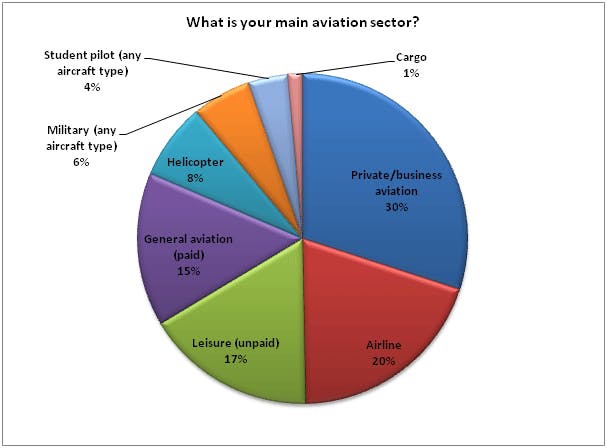
Age & experience
- Almost half of pilots (49%) who took part fell into the 25 – 44 age range. The next most popular age range was 45 – 64 (37%). Just 8% of pilots were aged 24 or under and just 6% over 65.
- Over 40% of respondents have been flying for over 20 years, with a further 27% for 10 years or more. Around a third of the audience (32%) have 10 years' flying experience or less.
- Age and experience profiles were broadly similar across all types of professional pilot (though leisure pilots were more likely to be younger and to have been flying for fewer years). Slightly more airline pilots had clocked up 20+ years' experience (55%) than in other sectors (41% overall).
- The majority (68%) of working pilots have always flown for a living, with just 32% overall having held a different main job previously. Military and private jet pilots were less likely to have worked in other fields before – with 88% and 72% respectively saying they have only ever worked as a pilot, versus 58% of airline pilots.
Geography
- 43% of the audience live in the UK and 27% in the USA/Canada.
- A further 18% live in the rest of Europe (outside the UK).
- Other respondents live in Asia, Africa, South America, Russia, the Middle East, Australia, New Zealand and the Caribbean.
Gender & relationship status
- 94% of pilots taking part in the survey were male, with 6% female. This male dominance was seen across all sectors of aviation.
- Just over half of all pilots (56%) said they were married and living with their spouse, with a further 14% living with a partner. Pilots living in the USA/Canada were more likely to be married than in other locations (71%), while more UK pilots were single (29%) than pilots living in other parts of the world.
- European pilots were more likely to be living with a partner than those in other locations.
- 6% of pilots overall were divorced or separated, with those living in Europe (outside the UK) slightly more likely to be divorced than those from other parts of the world.
Pilots on the road
- To gain an insight into their expertise behind the wheel as well as in the cockpit, the survey asked pilots how many attempts it had taken to pass their driving test.
- 100% of pilots who took part said they had passed a driving test, with a significant majority overall passing first time (83%).
- However the number of attempts taken to pass did vary quite considerably according to location. Those living in the USA/Canada were most likely to have passed first time (94%).
- Of those living in the UK (where driving tests are widely considered to be more challenging than in most other parts of the world), a lower proportion of pilots, 66%, had passed first time, which compares to a first time pass rate of 46% amongst the wider UK population . A further 26% of UK-based pilots passed on the second attempt and 7% on the third, with a small minority of 2% needing four or more attempts before removing the L plates. No pilots from other countries needed more than three attempts to pass.
- No significant variance in driving test pass rates was seen between pilots across different aviation sectors.
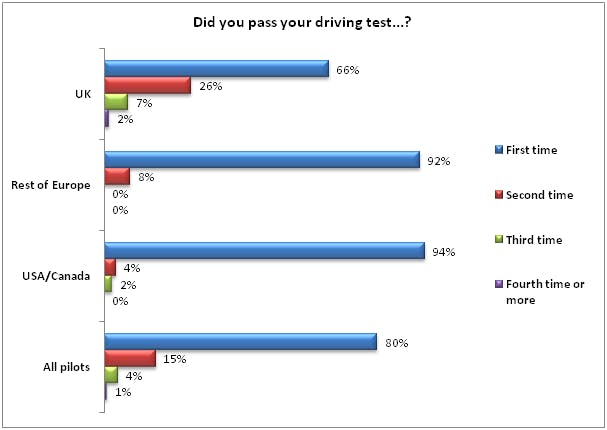
Job satisfaction & rewards
Job satisfaction & security
- The majority of pilots overall appear to enjoy their time in the cockpit with almost half (46%) describing their flying as "very stimulating and varied" and a further 44% enjoying "some variation – which keeps it interesting". 8% described their flying as "generally the same day to day", with a small minority of 2% overall describing their flying experiences as "repetitive and dull".
- Satisfaction ratings for their flying experiences did vary quite considerably according to aviation sector. Helicopter and military pilots gained the most enjoyment from their flying with 63% and 62% respectively stating it was "very stimulating and varied", closely followed by private jet pilots at 56%.
- Conversely over a quarter of airline pilots feel less positively about their time in the air, with only 25% describing it as "very stimulating and varied" and over a further quarter (27%) finding their flying either "generally the same day to day" or "repetitive and dull".
- In addition to lower enjoyment levels while flying, airline pilots also reported lower levels of operational control than any other pilots (with most major decisions being made by an operations department). 62% are given "very little control" or only "some control" such as decisions to carry extra fuel.
- Pilots in other sectors experience significantly more autonomy with almost 90% of helicopter pilots, and 80% of both military and private jet pilots, describing their operational control on a flight as either "significant" or "total". Leisure pilots (ie those who do not fly professionally) were the most likely to describe their operational control as "total" at 85%, with a further 10% enjoying "significant" control.
- Pilots appear to experience high levels of perceived job security with 72% overall reporting to feel either "very secure" or "fairly secure" in their jobs. Just 6% report feeling "not at all secure".
- There was some variance in perception of job security between sectors with military pilots the most likely to say they feel "very secure" (50%). Helicopter pilots are also more confident in their job security with 89% in total feeling either "very" or "fairly" secure. Airline and private jet pilots had broadly similar perceptions, with airline pilots feeling just slightly more uneasy in their jobs. 28% of private jet pilots described their roles as "very secure" versus a slightly lower proportion of airline pilots (23%). 8% of airline pilots believe their roles are "not at all secure", versus just 4% of corporate aviation pilots.
Pay & benefits
- All working pilots taking part were asked to define their basic annual salary according to salary bands, and to declare which benefits they receive from a list.
- The most common salary bracket overall was £40 000 - £70 000 ($63 000 - $111 000 or €48 000 - €84 000) with a quarter (25%) of pilots' annual basic salaries falling in this range. This compares to the average salary of a London underground driver (£46,000).
- The next most popular basic salary range overall was £20,000 - £40,000 ($32,000 - $63,000 or €24,000 - €48,000) with 21% of pilots overall earning in this band – in line with a teacher's salary.
- 18% of pilots earn a basic salary of between £70 000 and £100 000 ($111 000 - $158 000 or €84 000 - €120 000).
- At the upper end of the scale, 17% earn over £100 000 ($158 000 or €120 000).
- Despite the similar age and experience profile of airline and private jet pilots, those flying for airlines earn higher basic salaries than those flying business jets. While the most common annual salary bracket was the same at £40,000 - £70 000 ($63,000 - $111 000 or €48 000 - €84 000), over 80% of airline pilots earn in this bracket or above, versus just 67% of corporate aviation pilots. Almost a quarter (23%) of airline pilots earn over £100 000 ($158 000 or €120 000), whereas just over a quarter (27%) of private aviation pilots' basic salaries are under £40,000 ($63,000/€48,000).
- Most working pilots overall said they received some kind of benefit package as part of their remuneration; although over a quarter (27%) receive no benefits at all.
- Overall, 47% of pilots qualify for private medical insurance from their employer. Perhaps unsurprisingly this was highest for pilots living in the USA/Canada at 57%.
- Pilots in the UK and Europe were more likely to receive a company pension (45% in the UK and 55% in the rest of Europe), with just 28% of US/Canadian pilots receiving this from their employer.
- Military pilots were significantly more likely to benefit from a pension scheme than any other sector, with 83% receiving this benefit.
- Even more significantly than for salaries, the research indicated a clear difference in benefits between the two biggest pilot types covered by the survey – airline and private jet pilots.
- Just a quarter (26%) of corporate aviation pilots receive a company pension plan whereas over half (54%) of airline pilots do. Similarly just 12% of private jet pilots take advantage of a company share scheme, versus 22% of airline pilots. A bonus scheme was also more likely to feature in the remuneration of airline pilots (31% versus 18% of private jet pilots) and the majority (68%) of those flying for airlines benefit from subsidised flights, whereas only 9% of private aviation pilots receive any kind of flight discounts.
- Over a third of those flying in corporate aviation (38%) said they receive no company benefits at all – though this was even higher for pilots in other general aviation jobs (such as instructors and examiners) at 45%.
- Most working pilots across all sectors have seen no increase in earnings over the last 12 months, with 55% earning the same and 15% seeing their earnings decrease.
- In one economic ray of light for the private jet pilot, their remuneration appears to be moving in a more positive direction than most: 35% have received a pay increase of some kind in the last 12 months, versus only 26% of pilots in all sectors.
Pilots' views on aviation
What makes a good pilot?
- Pilots were asked their opinions on the top three qualities that make a good pilot, and were given a list of eight possible attributes to choose from, with each attribute then receiving an average rating score out of a maximum of 3.
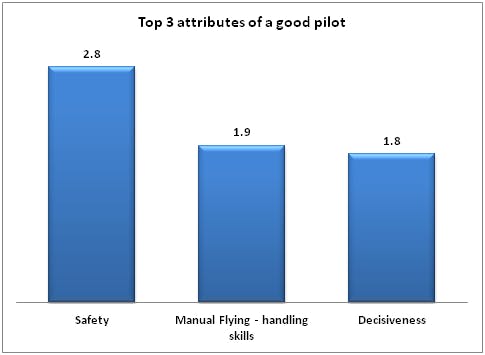
- Perhaps unsurprisingly almost all pilots – across all aviation sectors - considered a focus on safety ("Safety - making it the highest priority, regardless of commercial pressures") as the most important quality in a good pilot. 81% chose this as the number one attribute and it received an average overall ranking of 2.8.
- "Manual Flying - handling skills" and "Decisiveness" were considered the second and third most important skills for a successful pilot, receiving average ranking scores of 1.9 and 1.8 respectively overall.
- "Unshakeable - having a cool head" (1.7) and "Loyalty - to your company/ employer" (1.5) were seen as the next most important qualities overall. The attribute on the list perceived as the least most important in a successful pilot was "Commercial awareness - to save the company money", which received an average ranking of 1.4.
- Some variation in the concept of a good pilot was seen between pilot types. Military pilots showed the most notable differences in their responses, with fewer ranking safety as their top quality (though this was still their most popular top answer - just less overwhelmingly so). More of them rated "Unshakeable – having a cool head" as a top attribute than other pilot types. And, despite cutbacks and increased commercial awareness at the top of military organisations, no military pilots chose "Commercial awareness – to save the company money" as one of their top three qualities (though this was considered a top three attribute by other pilot types). None of them chose "Customer service – the passengers" as a top 3 quality either which may be of some concern to future employers in the private sector - given many military pilots do move across to airline or private jet careers.
- It was surprising to see that airline pilots – with comparatively lower levels of operational control – were the most likely to want to save the company money. Conversely, other than military pilots, private jet pilots were the least likely of all working pilots to choose commercial awareness as a top 3 quality. This is despite their stated, greater levels of operational control, including purchasing decisions such as where to buy fuel. This may indicated that the private jet operator, whose margins are tightening in an increasingly competitive market, could be asking more of its pilots in terms of improving the bottom line.
If you could fly back in time...
- The pilots were given a list of famous aviation events in history and asked which one they would most have liked to be at the controls for.
- The most popular overall was Concorde's first flight, with 20% of pilots wishing they could have taken Andre Turcat-March's place in the cockpit back in 1969.
- Second most popular was the first manned flight by The Wright Brothers in December 1903 (17%), closely followed by the first supersonic flight by Chuck Yeager in October 1947 (16%).
- There was considerable variance in opinions according to the pilots' aviation sector. Military and private aviation pilots made Chuck Yeager's pioneering supersonic flight their number one choice over Concorde's later supersonic achievement, with helicopter pilots giving top billing to the Wright Brothers. However airline and leisure (unpaid) pilots both chose Concorde's first flight as their favourite aviation moment, which earned it the number one spot overall.
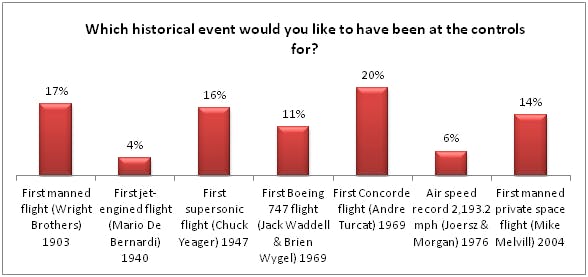
...and 5 years into the future?
- The pilots were given a list of factors and asked which would have the single biggest impact on the aviation industry over the next five years. They could also choose a different factor of their own.
- A huge majority (66%) predicted that the cost of fuel would have the biggest impact on aviation over the forthcoming five years.
- Environmental considerations was considered the second biggest factor by pilots overall (8%), followed by pilot shortages in third place (7%).
- Both airline and private jet pilots believe that pilot shortages will play a bigger part than environmental concerns, while helicopter pilots had more concerns about the environment than other types of pilots - with 16% choosing this as their most important factor in aviation's immediate future.
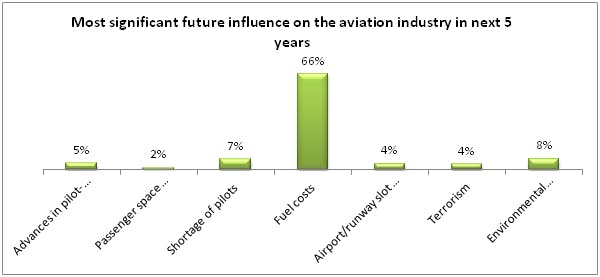
Motivations & previous career choices
Flying motivations
- All pilots were given a list of possible reasons why pilots choose to fly and asked to select up to three which most applied to them.
- The most significant motivating factor for pilots overall was "You had always wanted to be a pilot since childhood" with 65% choosing this as one of their top three reasons for taking to the air.
- This was followed by "To give you the ability to travel" in second place (19%) and "Your father/other family member(s) was a pilot" in third (16%).
- Military pilots showed the most differences in their motivations, compared to other pilot types. They were less likely to state that they had always wanted to be pilots (although this was still their biggest reason overall) and more likely to cite the inspiration of pilots in the family amongst their biggest motivations (29%). They were also more likely than other types of pilots to have chosen a flying career because "It's a role which generates respect from others" (14% versus 9% on average overall).
- Private jet pilots were also more likely than average to have been inspired to fly by other pilots in the family, with 20% citing this as a motivating factor.
- Airline pilots were most likely to have chosen to fly for more commercial reasons ("you were attracted by the pay and benefits") with 16% naming this as a motivation, versus just 8% of pilots overall.
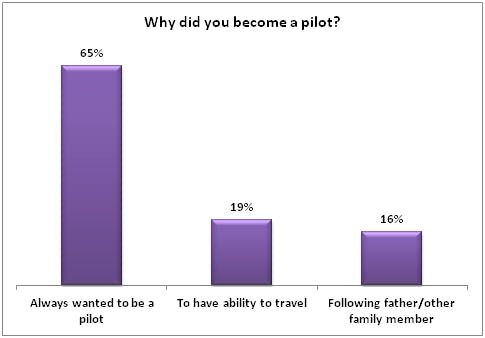
Previous careers
- All professional pilots were asked if they had worked in a different field before becoming a pilot. Over two thirds (68%) overall had always been a pilot. The remaining third (32%) had worked in a variety of fields before making flying their career. Military and private jet pilots were more likely to have only ever worked as a pilot (88% and 72% respectively) and airline pilots most likely to have transferred into aviation from other professional fields (42%).
- 18% of pilots who had worked in a different field had a senior business background - either running their own company or in a senior management role within a business. A further 12% worked in sales or marketing and 6% in IT.
- Engineering was another popular choice of previous career, with 17% having worked in this field.
- 13% had decided to become a pilot having seen the role at close range while working in aviation - as ground staff, cabin crew or in an operations role.
- 11% were previously in the military (in a non-flying role).
- Other respondents' previous roles included teacher, police officer and translator. More unusual backgrounds included the clergy and farming, with one pilot claiming to have previously worked professionally as an opera singer.
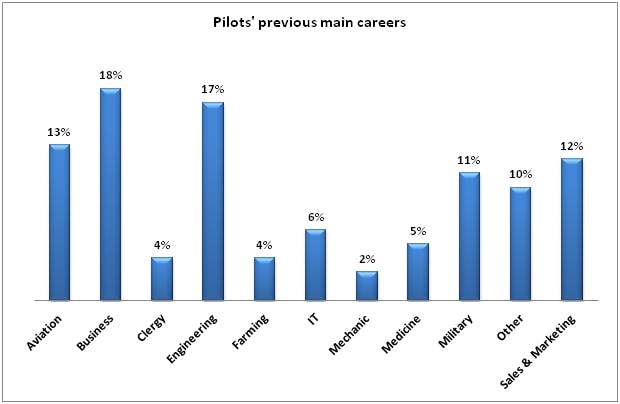
Inside the pilot's flight bag
Flight bag must-haves
- The survey asked pilots to reveal the top three items they always carry in their flight bags (other than phone, passport, keys and wallet).
- Despite advances in technology for pilots' cockpit requirements, the most popular response was maps and charts, with 16% naming one or both of these as one of their three must-haves.
- Technology clearly plays a significant role in pilots' working lives with 13% naming a laptop, iPad or other tablet as amongst their essential items; 5% a GPS or other navigational device; and a further 5% naming other gadgets such as iPods, adaptors and e-readers as essential kit for their travels.
- Traditional reading material still holds appeal for many however, with 3% always packing a book or magazine in their bag.
- A spare headset was a popular choice with 7% of pilots naming this as one of their must-haves.
- Universal travel items also featured high on the list, with a torch or flashlight named by 6%, toiletries of various kinds by 7%; spare clothing by 5%; and another 5% always travelled with snacks or drinks.
- Other items named by more than one pilot included sunglasses; books; sports equipment; spectacles; and batteries.
- More unusual choices for flight bag must-haves were a bible, cigarettes, tiger balm, nail polish remover pads and a bike pump.
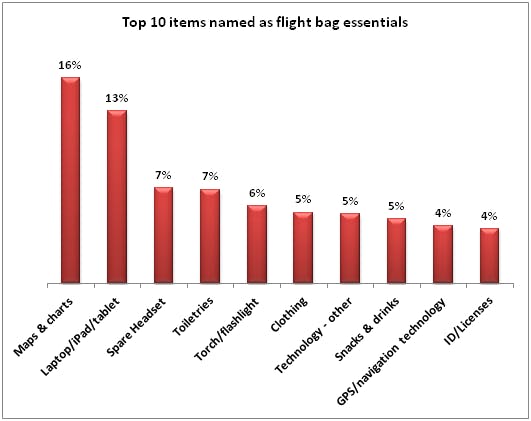
Travel tips and avoiding jet lag
- Pilots were asked to give their top travel tip and specifically, how they avoid jet lag.
- As perhaps many would expect, pilots appear to be highly organised and practical in their approach to travel. Almost a quarter (22%) gave a tip relating to the importance of planning and preparation, with advice including: "Failure to prepare means you need to be prepared to fail"; "Be prepared for the unexpected" and "leave plenty of time to get to the airport".
- Packing lightly also featured heavily with 15% giving their top tip relating to taking as little luggage as possible. Some gave detailed solutions to keeping baggage to a minimum including: "Dual-use items - such as chargers - are a must".
- On a less practical note, 8% of pilots advised on the importance of having fun and enjoying the experience of travel including: "Travel is interesting. Do as much of it as you can. Experience different cultures"; and "Enjoy the journey for the sake of the journey".
- Other more unusual advice included: "Take toilet paper"; and "To dry swimming costume to pack, lay it in a dry towel, roll up the towel and twist it - gets most of the water out".
- The most popular advice for avoiding jet lag was simple: Get more sleep. 23% of pilots recommended sleeping as much as possible before and after the flight and/or taking regular naps.
- Exercise, healthy eating and drinking plenty of water were also popular tips for keeping jet lag at bay, with advice including "sports and fruits" and "drink lots of water and exercise".
- Pilots' opinions were divided on whether to adjust to the destination time zone as quickly as possible to avoid or minimise jet lag. 16% advised adjusting immediately, whereas a further 6% recommending staying in a routine based on the point of origin.
- Similarly the approach to alcohol was divided, with some suggesting avoiding it altogether, but others recommending a tipple to help sleep patterns adjust (when travelling off duty of course).
- A significant proportion (13%) of pilots claimed not to suffer from jet lag at all with one commenting: "Jet lag doesn't exist. It's called being tired".
ABOUT PRIVATEFLY.COM
PrivateFly.com is a revolutionary online booking platform that allows private jet customers to compare the market for available private charter aircraft - at the lowest prices. It was awarded Website of The Year in Flight International's 'Webbies' awards in 2011 which recognise online excellence across the whole of the aviation industry - the judges describing it as "the iTunes" of aviation. PrivateFly was also ranked as the fastest growing company in the European aircraft charter industry by Plimsoll Business Intelligence 2011.
For a personalised quote or further information on private jet hire call +44 1747 642777 or contact us.


